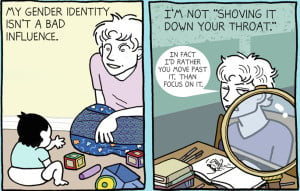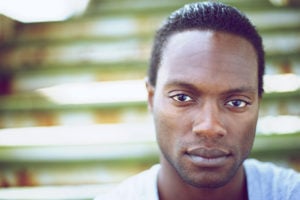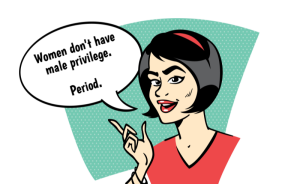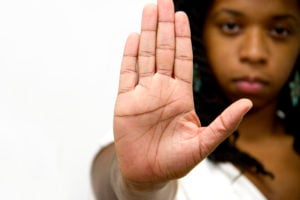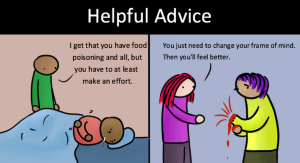Over the years, I have been asked to talk and write on a number of occasions about the notion of allyship and solidarity, about what it means to be an ally, how one goes about effective solidarity work, and how not to be so very terrible at being an ally.
I think this trend of asking people who share my identity about this topic is simultaneously ironic and important.
It’s important because these are 100-level questions, and unless they have explicitly offered themselves as a resource to those of us with privilege, it is not the responsibility of oppressed and marginalized people to be our educators. Those of us who strive for solidary should be willing to put in that emotional labor to help those who share our identity understand some fundamental tenets of ally work.
It’s ironic, though, for two reasons.
First, as much as I can offer from my experience on these topics, the best thing people of any form of identity privilege can do to understand solidarity is to simply listen across difference. If we are willing to listen over time, we will understand pretty well what is expected of us by those with whom we want to act in solidarity.
Second, considering how much I’ve screwed up in my own journey, I don’t always feel super qualified to be offering help to others.
But I suppose in some ways, my mistakes are what make it possible for me to have anything at all to offer other White folks or other men or other able-bodied people; hopefully, my learning can help other people with privilege consider how to strive for more accountable allyship.
So often, our “learning” must come at the expense of marginalized and oppressed people. So hopefully, offering some of the lessons I’ve learned about solidarity from making difficult mistakes can help you consider different ways of being that don’t demand so much from marginalized and oppressed people.
So here are some important lessons I think all people striving for allyship should know – ones I wish I had known so that my mistakes didn’t have to demand hurt or emotional labor from others.
1. The Moment You Think You Have Allyship Figured Out, You’re Going to Fuck Up
Solidarity isn’t a state of being, and “ally” isn’t an identity. There is no point that someone can reach where the work is done.
And even knowing that in theory, there have been times where I have gotten comfortable, where I have felt like I knew it all, and where I was complacent about what solidarity can or should look like.
And without fail, every time that I have decided (whether consciously or not) that my learning is finished or even that I just know more than most people who share my identity, I’ve ended up making mistakes that hurt people.
Though I won’t go into details to avoid further hurting those who I injured, the worst of these mistakes came when I first started having people look to me for leadership on issues of race and racism.
My ego got ahead of effective allyship, and I acted against an injustice without doing the proper listening and consulting. By doing so, I ended up exposing women of Color to further marginalization and possible harm.
It was a huge mistake, one I cannot take back, and it damaged relationships and trust in ways that I won’t likely ever repair.
I apologized and worked hard to listen intently to those who I had hurt, and now my responsibility is to do better going forward. And one of the simplest ways that I can do better is to remember that my responsibility to listen and to continually learn is a life-long journey.
2. The Idea of ‘Using One’s Privilege for Good’ Can Often Reify Privilege
I have a really hard time with the phrase “use your privilege to help those who don’t have privilege.” First, it implies a paternalistic sort of commitment to justice work where we work solely on behalf of others.
Second, “using privilege,” even with great intentions and toward anti-oppressive ends, fundamentally reifies privilege itself because it relies on the continuation of systemic privileges rather than their destruction.
That’s not to say that White people shouldn’t take advantage of our access to other White people to call them in to change or that cis people shouldn’t take up difficult conversations about transphobia knowing that we will be more readily heard.
But “using our privilege for good” can lead to some pretty problematic actions on the part of those who wish to be allies.
In my own case, I once reached out to a Black professor early in my anti-racist journey because some other White people in his class told me that he was “so harsh” that it regularly made White people cry.
Because I knew the professor, I thought I’d let him know (in my benevolence) that I had learned that White people were more likely to listen if we built bridges to their understanding rather than tearing them down.
Needless to say, the professor let me have it.
He explained not only the racist presumptuousness of a 19-year-old White person telling a middle-aged Black professor how best to combat White supremacy, but he pointed out that my even thinking I could reach out to him in this way was a function of my privilege.
I thought I was “using my privilege” of “really understanding White people and how to reach them,” but really, I was being incredibly racist.
Had I considered more critically my role (and that “using my privilege” isn’t warranted), it never would have happened. Instead, I would have called in my fellow White folks into a conversation about our own emotional fragility in race-related conversations that can draw attention and energy away from the actual victims of racism.
3. Allyship and Solidarity Are Relationship-Based
As such, we can’t be a “good ally” to every person of a marginalized identity at once.
The hardest lesson for me to learn as I began to form and articulate my social justice values was that solidarity was tremendously relational and, as a result, is complicated and difficult!
It’s impossible for me to act as a feminist ally to every single woman if for no other reason than because women aren’t a monolith. There will be people of every gender who I vehemently disagree with on gender justice issues, and aligning with women to whom I’m accountable can sometimes mean that I’m not allying myself to the beliefs and values of other women.
Noting this, I can still listen to people who don’t share my identity, trying to truly hear them and respect where they’re coming from. But at the end of the day, we have to decide what our vision of justice looks like and to whom we are most accountable, something best done in diverse community and through lots of self-reflection.
A few years back, I had some friends and comrades who have disabilities who preferred the term “differently abled” (notably, many of them have shifted their language since). Thus, because they were the folks to whom I was accountable in my language usage, I used that term in an article I published online.
Someone who identified themselves as disabled took issue with my use of the phrase. It was hard to simultaneously really hear them and understand why they didn’t like “differently abled” while explaining that I would use the term so long as those with whom I was in an accountable relationship thought that was the most inclusive language.
That’s a hard balance to strike! And I didn’t necessarily do a good job of walking that line, so the person who approached me on Twitter felt dismissed and hurt.
The point here is that we aren’t always going to do it well, but any time we’re in a position of privilege, we need to be at once willing to listen, but also willing to remain strong in our accountable commitment to those with whom we’re in community.
After all, I will never be in alignment with a Chicanx person who uses the term “illegals” to describe newly immigrated Latinx people. But I can still be sure that I’m not patronizing or racist in objecting to their use of that term.
In moments like these, it’s best for me to remember that it’s not my lane to convince someone who doesn’t share my identity that they should think the way that I do or that my friends do.
It’s my job to call in those who share my identity and to do my best to help others like me join the movement for justice.
4. Solidarity Demands Tremendous Vigilance About Our Privilege
Speaking of the “I-word,” I was recently participating in a rally against the Tucson opening of “Illegal Pete’s,” a shitty White-bastardized Mexican restaurant owned by one of the more smug racists I’ve ever encountered.
I was listening to the owner Whitesplain to some young Latinx activists the meaning of the word “illegal” after having them say explicitly how that word hurts them, and I lost my cool. I called him out, noting that he and I are insulated from the violent implications of labeling human beings illegal because of our Whiteness.
We went back and forth for a few minutes before another activist put her hand on my shoulder. I let it go, and a few minutes later, she reminded me that this was not the time or place for my voice to be centered (thanks, Sarah!).
I wasn’t being vigilant about my privilege, and it showed up in my taking over a space that wasn’t mine to take over.
It was a good reminder for me in that context, and it’s a great reminder for all of us who strive for accountable solidarity: We need to check our privilege at all times, even when we’re doing the right thing by showing up when called upon.
5. Working for Justice Doesn’t Mean the Same Thing for Every Person Who Strives for Solidarity
Recently, my friend Lex posted a loving and compassionate call to his fellow White people to show up for an important Black Lives Matter action. In his call, he noted that some people are not physically capable of joining in a long march or are prevented by things like anxiety from participating in events with large crowds like that.
He reminded us that there are lots of access points in working for justice, and that we all need to find the ways that push us to our greatest level of accountability and influence.
This reminder was a good one for me – I’ve definitely had times in my solidarity journey where I was more judgmental of people who share my identity who I didn’t think were doing allyship “right.”
While all solidarity work ought to involve some level of risk, what risk entails can only be assessed by each individual. What isn’t particularly challenging or risky in speaking out for LGBTQIA+ rights for me as an activist might be impossible for a closeted gay friend in rural Tennessee who wants to speak out against the violence Trans people experience, but fears retribution from his family on whom he relies financially.
Thus, rather than treating allyship like a competition, we ought to direct our energies toward challenging ourselves and those who share our identities to step up, to risk something, and to strive for justice in the way that best works for our full selves.
***
The truth is: You’re going to screw up. Strive for justice anyway.
Working for solidarity means risking mistakes. And we’re all going to make them. But the important part is that we keep working to change ourselves for the better in hopes of changing our relationships, our communities, and the wider world around us.
One aspect of White fragility that I’ve definitely seen show up in myself is the inclination to quit, to take my ball and go home, when criticized for falling short in efforts at being an ally.
Too often people of privilege react to criticism with, “This isn’t how you win allies! I was trying to help!”
But it isn’t the responsibility of marginalized and oppressed people to “win allies.”
It’s our responsibility as people of privilege to earn trust because we all benefit when oppressive systems are dismantled, and true solidarity means setting aside our ego to work for collective liberation.
So when you make mistakes, as we all inevitably will in aspiring for solidarity, listen to those who are calling you out. Apologize earnestly and without caveat. And then work to do better.
[do_widget id=’text-101′]
Jamie Utt is the Founder and Director of Education at CivilSchools, a comprehensive bullying prevention program, a diversity and inclusion consultant, and sexual violence prevention educator based in Tucson, AZ. He is currently working toward his PhD in Teaching, Learning, and Sociocultural Studies at the University of Arizona with research interests in the role that White teacher’s racial identity plays in their teaching practice. Learn more about his work at hiswebsite here and follow him on Twitter @utt_jamie. Read his articles here and book him for speaking engagements.
Search our 3000+ articles!
Read our articles about:
Our online racial justice training
Used by hundreds of universities, non-profits, and businesses.
Click to learn more






